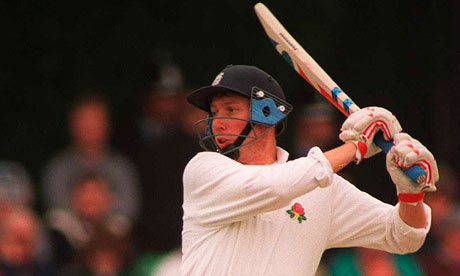
The wretched weather has at least given cricketers of all levels plenty of time for reading. I fancy many still sheltering in the pavilion might be enthusing over the eloquently unputdownable new novel Chinaman by Shehan Karunatilaka, a floridly epic tale about, among other matters, a reprobate sportswriter and a Sri Lankan spin bowler who out-Muralis Muralitharan when it comes to convoluted and devious deception over 22 yards.
Chinaman is the latest in a sudden batch of literate and literary cricket fiction. Half a dozen years ago there was general acclaim for Joseph O'Neill's beguiling Netherland, a post-9/11 New York drama centred on cricket; soon afterwards came more select rave notices for Jennie Walker's lighter 24 for 3, in which a five-day Test match was nicely boxed around sexy parameters. And an imminent midsummer treat promises to be the first serious novel of county cricket, Settling The Score by Peter Gibbs, the former Derbyshire scorer of nearly 9,000 first-class runs and a rich pile of television scriptwriting credits. I forecast it will be as authentic as it is gripping, as full of intrigue as of fun – certainly if it is anything like Gibbs' luminous monograph of the maestro SF Barnes in the new Wisden.
The Almanack's 2012 book reviewer is this page's own esteemed Man Friday, Harry Pearson, who was utterly charmed by Chinaman and Karunatilaka's "wry, playful and digressive style", a commendation at once dittoed by the Guardian's unfailingly on-the-ball paperback reviewer Nicholas Lezard, who serenaded the "long, languorous and winding novel of tragedy, farce, laugh-out-loud humour and great grace".
Such approbation coincides with next week's centenary of the much loved, but too often neglected, JL Carr, whose classic A Season in Sinji was nominated with erudite enthusiasm on Radio 3 only the other day by the former Test cricketer Ed Smith as the best cricket novel of all – "Carr wisely takes his cricket away from village green, cream teas, warm beer and English idyll and transposes it for reality and honesty's sake to the brutal, unforgiving and alien fields of West Africa".
Whenever I'm reminded of Carr's haunting, stifling Sinji, however, I can't help recalling the onliest Alan Gibson's first unforgiving review in The Cricketer in 1967: "Carr forces his analogies, he strains his language, to show that life is just a game of cricket, which is neither more nor less true than that life is just a bowl of cherries. Mr Carr is very strong on breasts and lavatories, which I suppose is mandatory in the modern novel. Just as I was beginning to get interested in the bosoms, there was a piece about cricket; and just as I was beginning to get interested in the cricket back came the bosoms, and the dirt, and the violence".
Mind you, for all these classy mod challenges for fiction about cricket (as opposed to fiction which includes some cricket), I reckon Mike is still my main man. PG Wodehouse's Mike was very much a first-class opening bat and verily a Varsity swot as well – a prophecy perhaps for the coming of Ed Smith himself. Or, even more literally, for Mike Atherton or Mike Brearley. Each could be a dead ringer for the fictional hero. To be sure, Mike the novel remains enduringly re-readable. It was of course Plum's first "adult" novel, published by A & C Black in 1909 after being serialised as a mere schoolboy yarn in The Captain. To his death, Wodehouse would insist Mike was the very best of all his 66-year output. Nor was he the only great writer to think so.
In Malcolm Muggeridge's autobiography The Infernal Grove, the over-enunciating old sage of Sussex (who had no time himself for such dotty diversions as cricket) writes of the day he introduced Wodehouse to George Orwell in Paris in 1944. The two had never met before and Mugg was relishing the presumption that the three of them would put serious matters of the world to rights. No such luck, and poor Muggeridge was horrified:
"The two of them just talked cricket. They obviously got on very well. Wodehouse had played the game well at Dulwich, and Orwell had enjoyed it at Eton. It was clear they both loved their cricket. Later Orwell and I talked about Wodehouse, and I mentioned how very poorly writers can judge their own work and that Wodehouse had told me he considered his best ever book to be Mike, an early and surely immature schoolboy story. Of it, Wodehouse told me in all seriousness that the book to him still captured the 'ring of a ball on a cricket bat, the green of the pitch, the white of the flannels, the cheers of the crowd' or words to that effect. 'Certainly', said Orwell to my immense surprise, 'Wodehouse is perfectly right. Mike is undoubtedly his very best book.'"
When first published, some critics presumed Plum had based his hero on England's 1903 Ashes double-centurion from Malvern, RE Foster. Early on, the author firmly states his case: "An entirely modest person seldom makes a good batsman. Batting is one of those things which demand first and foremost a thorough belief in oneself. It need not be aggressive, but it must be there."
You could say the same of successful novelists.

